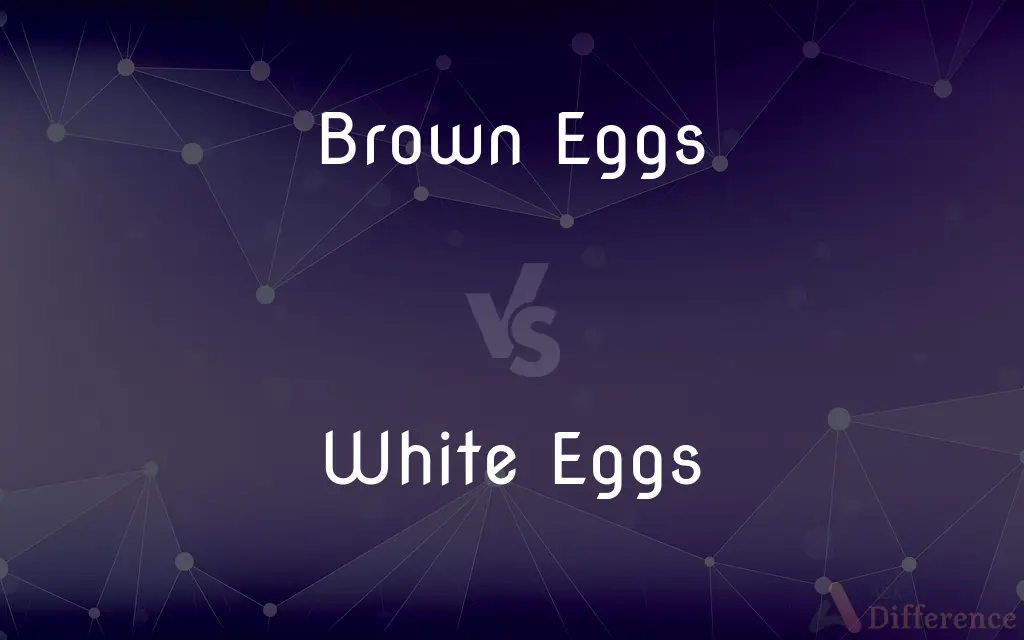Brown Eggs vs. White Eggs — What's the Difference?
By Fiza Rafique & Urooj Arif — Published on February 28, 2024
Brown eggs come from hens with red feathers and earlobes, while white eggs are laid by hens with white feathers and earlobes. Nutritionally, both are identical, with differences arising from hen diet and environment.

Difference Between Brown Eggs and White Eggs
Table of Contents
ADVERTISEMENT
Key Differences
The primary difference between brown and white eggs lies in the breed of the hen that lays them. Hens with red or brown feathers and matching-colored earlobes typically lay brown eggs, whereas hens with white feathers and white earlobes lay white eggs. This distinction is purely genetic and does not affect the nutritional value, taste, or cooking properties of the eggs.
Nutritionally, both brown and white eggs are identical, offering similar amounts of protein, fats, vitamins, and minerals. Any nutritional differences between individual eggs are more likely due to the hen's diet and living conditions rather than the color of the eggshell. For instance, hens that are free to roam and consume a more natural and varied diet may lay eggs with slightly higher nutritional content.
In terms of taste, there is no inherent difference between brown and white eggs. Perceptions of taste differences are usually psychological or based on the freshness of the egg rather than the shell color. However, the feed and environment of the hen can influence the flavor subtly, but this is independent of the egg's color.
Market price differences between brown and white eggs can occur, with brown eggs sometimes priced higher. This is not due to any intrinsic quality differences but may be associated with the larger size of some brown-egg-laying hen breeds, which require more feed, or the perception that brown eggs are more "natural" or "organic" compared to white eggs.
The choice between brown and white eggs can be based on personal preference, availability, or price considerations, rather than any significant differences in nutrition or quality.
ADVERTISEMENT
Comparison Chart
Hen Breed
Red or brown feathers, red or brown earlobes.
White feathers, white earlobes.
Nutritional Value
Identical to white eggs.
Identical to brown eggs.
Taste
Same as white eggs, influenced by hen's diet and freshness.
Same as brown eggs, influenced by hen's diet and freshness.
Price
Can be higher due to perceptions or higher production costs.
Often lower, but varies by region and production methods.
Shell Color Cause
Determined by the hen's genetics.
Determined by the hen's genetics.
Compare with Definitions
Brown Eggs
Often perceived as more "natural".
Some consumers prefer brown eggs, associating them with organic farming.
White Eggs
Price varies by production and region.
In some areas, white eggs are cheaper due to lower production costs.
Brown Eggs
Price can be higher.
Brown eggs may cost more due to the larger size of the hens that lay them.
White Eggs
Identical in nutrition to brown eggs.
White eggs provide the same vitamins and minerals as brown eggs.
Brown Eggs
Nutritionally similar to white eggs.
Brown eggs contain the same amount of protein as white eggs.
White Eggs
Commonly found in supermarkets.
White eggs are often more available in grocery stores due to the efficiency of white-egg-laying hens.
Brown Eggs
Taste influenced by hen's diet, not shell color.
The fresh taste of a brown egg is due to the hen's varied diet.
White Eggs
Laid by hens with white feathers.
The Leghorn hen, with its white feathers, is a prolific layer of white eggs.
Brown Eggs
Laid by hens with red or brown feathers.
The Rhode Island Red hen, known for its brown feathers, lays brown eggs.
White Eggs
Taste not affected by shell color.
The flavor of white eggs is determined by the freshness and the hen's diet.
Common Curiosities
Can you tell the difference in taste between brown and white eggs?
There is no inherent taste difference between brown and white eggs. Any perceived differences are usually due to the egg's freshness or the hen's diet.
Why are brown eggs often more expensive than white eggs?
Brown eggs can be more expensive due to factors like the larger size of brown-egg-laying hens, which require more feed, and consumer perceptions of brown eggs being more "natural" or "organic."
Are brown eggs healthier than white eggs?
Nutritionally, brown and white eggs are identical. Differences in health benefits would be due to the hen's diet and living conditions, not the color of the eggshell.
Why do some recipes specify the use of brown or white eggs?
Recipe specifications for brown or white eggs are often based on traditional or regional preferences and do not typically reflect any difference in the eggs' cooking properties.
How can I tell if an egg is fresh?
Freshness can be tested by placing an egg in water; fresh eggs sink, while older eggs float due to the air cell inside the egg enlarging over time.
Do brown eggs have a longer shelf life than white eggs?
The shelf life of an egg is not determined by its color but by how it is stored. Both brown and white eggs have similar shelf lives when stored properly.
Is the yolk color different between brown and white eggs?
Yolk color is influenced by the hen's diet rather than the color of the eggshell. Diets rich in carotenoids can result in darker yolks in both brown and white eggs.
Why do some people prefer brown eggs over white eggs?
Preferences for brown eggs may stem from perceptions of them being more natural, healthier, or associated with free-range farming practices, although these are not directly related to the egg's shell color.
Do brown eggs have a thicker shell than white eggs?
Shell thickness is more related to the age of the hen than the color of the egg. Younger hens tend to lay eggs with thicker shells, regardless of whether the eggs are brown or white.
Are all brown eggs free-range or organic?
Not all brown eggs are free-range or organic. The egg's color does not indicate how the hen was raised or what it was fed.
Are there any breeds of chickens that lay eggs other than white or brown?
Yes, some chicken breeds lay eggs in other colors, including blue, green, and speckled. These colors are also determined by genetics.
Is there any nutritional benefit to choosing organic eggs over conventional eggs?
Organic eggs may have slight nutritional differences due to the hens' organic feed and living conditions, but these differences are not related to the color of the eggshell.
Why do some regions predominantly have brown eggs while others have mostly white eggs?
Egg color preference varies by region and culture, often influenced by local farming practices and consumer perceptions. This leads to variations in the availability of brown or white eggs.
Can brown and white eggs be used interchangeably in recipes?
Yes, brown and white eggs can be used interchangeably in recipes as there is no difference in their cooking properties or nutritional content.
Do hens of different colors lay eggs with different nutritional content?
The hen's feather color does not determine the nutritional content of an egg. Nutritional differences are more influenced by the hen's diet and living conditions.
Share Your Discovery

Previous Comparison
Swedish Massage vs. Deep Tissue Massage
Next Comparison
Linguist vs. PolyglotAuthor Spotlight
Written by
Fiza RafiqueFiza Rafique is a skilled content writer at AskDifference.com, where she meticulously refines and enhances written pieces. Drawing from her vast editorial expertise, Fiza ensures clarity, accuracy, and precision in every article. Passionate about language, she continually seeks to elevate the quality of content for readers worldwide.
Co-written by
Urooj ArifUrooj is a skilled content writer at Ask Difference, known for her exceptional ability to simplify complex topics into engaging and informative content. With a passion for research and a flair for clear, concise writing, she consistently delivers articles that resonate with our diverse audience.
















































